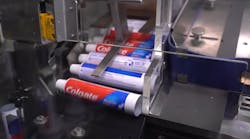Colgate-Palmolive: Successfully Scaling Technology Worldwide
Colgate-Palmolive’s secret to successfully scaling manufacturing technologies is simple. Don’t have any secrets.
Warren Pruitt, senior vice president for global engineering services at Colgate-Palmolive, took his position in early 2018, a year before his employer released its five-year corporate strategy that included a push for automation and digitization.
Shortly thereafter, Pruitt established a community of practice of 50 to 60 colleagues from 45 plants around the globe that meets bi-weekly to identify new manufacturing technologies, the best plants at which to pilot those technologies and then how to scale the successful pilots.
“My team and I are not going to create all the ideas to come up with all the good stuff. A lot of that’s going to come up through the plants, and then we figure out how to leverage that and move it into the other regions and other plants,” Pruitt says.
Pruitt began by recruiting category engineers, the senior-level managers and directors who oversee investment strategy for plants within their region and category (such as oral care, personal care or home care products) and who report to regional supply leads. Pruitt then added the project engineers who actually implement technology deployments.
The engineers in the community largely do not report to Pruitt but have “a very strong dotted line” to him and his team.
“It’s proven itself very successful because we’ve identified opportunities that we would have probably never seen, or it could have been one or two years later. Now we’re seeing it immediately based on successes of individual plants and also successes of what we’re developing here at the center,“ Pruitt continues.
Almost a dozen technology pilots currently run on the Colgate side of the company with the results shared freely to anyone in Pruitt’s community of practice. When everyone knows what everyone else is doing, with no secrets about which pilots take place and their results, it’s easy to get plant managers excited and lined up to scale the technologies.
Sharing Technology Wins with Global Teams
For example, engineers from plants in Asia shared their successes with integrated cobot systems that load and unload packaging materials or manage finished goods. Pruitt and his team now work with their partners in Asia to determine how to cost-effectively deploy the same systems in North American plants where integrators command higher hourly rates.
Centrally led discoveries include the Augury predictive maintenance system. Pruitt and his colleague Gary Binstock discovered Augury at the American Manufacturing Summit in Chicago. The wireless predictive maintenance system uses IoT sensors to monitor machine vibration and detect mechanical problems by comparing that information to a database of vibration data gathered from identical machines at other locations.
Colgate-Palmolive piloted the system at the Colgate oral care plant in Morristown, Pennsylvania. Within three months the system generated two machine health alerts that avoided $60,000 in downtime costs.
“When we published the initial results of the first pilot, [the engineers at] all the Colgate plants in North America and then all the Hills [Pet Nutrition] plants recognized the results, the benefits, and they went broad-based and scaled all their plants,” Pruitt says. The Augury system now runs in four Hills plants in the United States and plants in the Czech Republic and the Netherlands.
Or take, for another example, Colgate-Palmolive’s digital twin system, developed in partnership with the software company Twin Thread. Colgate-Palmolive wanted a system that would automatically adjust production parameters based on quality assessment data. After an 18-month development process, Colgate-Palmolive piloted the IIoT-based digital twin at a Hills Pet Nutrition plant in India.
The system made between 90% and 95% of all quality adjustment parameters automatically, requiring no intervention of operators on the floor. Other plant managers in India, seeing the pilot results, clamored for access to the system, and now Colgate-Palmolive scales the digital twin software to Hills plants around the globe.
When Pruitt and his team rolled out in North America the Augmentir system that digitizes standard operating procedures (SOPs), work instructions and checklists for operators to review on mobile devices, engineers from plants in India and Vietnam saw the successful deployments in North America and scaled Augmentir to their own plants.
It helps that Pruitt travels extensively to Colgate-Palmolive plants around the world to personally meet with his engineering managers, to know which ones dissect new technologies down to their finer points and which managers will jump into new pilots based in his recommendation alone.
“Everyone’s different. Everyone wants to make sure they’re doing the right thing. But the biggest benefit [of running the communities of practice and traveling] is the fact that I know all of them. I can pick up the phone personally and call them and walk through a solution with them and come to the right conclusion of how we move things forward.”
Open communication engenders trust that makes scaling even faster.
“Five years ago, every plant wanted to do a test and learn, even if it was the same technology. ‘If I don’t test it and validate it, how do I know it's going to work?’ Now, five years later, we are in a mode of ‘We piloted at one location and it worked, it’s going to work,’ and the end-to-end leaders around the world help us drive that, that message.”
Pruitt’s personal philosophy on sharing information freely with internal teams to enable broad success mirrors Colgate-Palmolive’s philosophy on sharing information, even with competitors, and even if the knowledge is proprietary, to literally make planet-sized wins possible.
“When we developed the 100% recyclable tube we realized that this isn’t just about Colgate, because we represent however many billions around the world. This is about an industry. So we shared that technology with our competitors, with whoever wanted it, and why I mentioned that is, I think for the betterment when you start looking at sustainability and you start looking at just, you know, protecting people, the planets and everything.”
The Importance of External Partnerships
Successfully scaling technology also depends largely on finding providers looking for partners, not customers, says Pruitt.
Before Augury, Colgate-Palmolive piloted a different predictive maintenance system from another company that more or less slapped IoT sensors on equipment and then lacked the right software to drive the system effectively. Pruitt admits that he and his team probably didn’t ask the right questions at the outset, as no technology company had previously offered Colgate-Palmolive a predictive maintenance system.
Now, they know better. Introductory calls with any potential technology supplier involve Pruitt and at least two or three of his engineers to get into the details immediately.
“To find out who you want to really partner with versus who you want to walk away from, have the right people in the room and make sure that you are not jumping too fast, because many times it’s too good to be true. … My team is smarter than I am. I’ve got some excellent engineers and they know what questions to ask.”
Pruitt wants lists of current customers and contact information or failing that, access to case studies. Without that information, a second conversation may not take place. And who Pruitt speaks with during that second conversation speaks volumes as to whether he’s found a partner or not.
After an initial meeting to discuss Augury’s predictive maintenance technology, the company’s CEO personally attended a second meeting to discuss a potential partnership with Colgate-Palmolive. Pruitt not only maintains direct contact with the CEO and other top-level leadership at the company, he also serves on Augury’s customer advisory board, giving input on potential decisions or opportunities.
It would also help manufacturers find partners, versus just suppliers, if everyone spoke more openly amongst themselves, Pruitt says. He regularly sits on roundtable discussions where manufacturers tend to share only up to the point where they lead colleagues in a certain direction, and then go no further.
“If it’s not a proprietary discussion point, like our success with a [Twin Thread] or an Augury, we need to get much more comfortable about sharing these things with our competitors, with our peers in other industries, so that they’re not making the same mistakes as us,” Pruitt says.
“I think we’ve got to go further and have those more candid discussions so that everybody is elevating their performance, because at the end of the day you want everybody to be better at material losses, or their yields or their throughput. I think that there’s a lot of work to be done in that communication space, to get companies more comfortable. If, again, it’s not sharing something proprietary, how do you have that conversation so that everybody benefits?" Pruitt adds.
About the Author
Dennis Scimeca
Dennis Scimeca is a veteran technology journalist with particular experience in vision system technology, machine learning/artificial intelligence, and augmented/mixed/virtual reality (XR), with bylines in consumer, developer, and B2B outlets.
At IndustryWeek, he covers the competitive advantages gained by manufacturers that deploy proven technologies. If you would like to share your story with IndustryWeek, please contact Dennis at [email protected].


